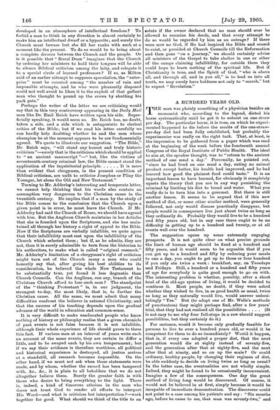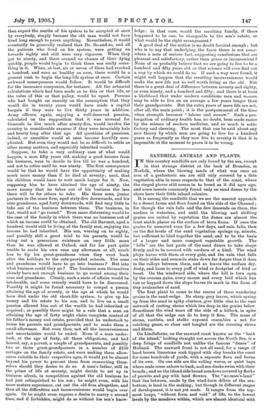A HUNDRED YEARS OLD.
THE man was plainly something of a physician besides an economist who, according to the legend, dieted his horse systematically until he got it to subsist on one straw per day. The particular horse, it is true, on which he experi- mented happened to die before the merits of the one-straw- per-day diet had been fully established, but probably the experimenter was really on the right tack. That, at least, is the impression to be gathered from a paper which was read at the beginning of the week before the fourteenth annual Congress of the Royal Institute of Public Health. The ideal to aim at, the speaker thought, was to "return to the ancient method of one meal a day." Personally, he pointed out, "since he had lived on one meal a day, eating no animal product except butter, his health had improved, and he had learned how good the plainest food could taste." It is an important lesson to have learned, for obviously it completely upsets the theory that you are in any way punishing the criminal by limiting his diet to bread and water. What you really do is to turn him into a gourmet. But there is still another lesson. It seems to be argued that if this new method of diet, or some other similar method, were generally followed, not only would disease practically disappear, but people would in consequence live just about twice as long as they ordinarily do. Probably they would live to be a hundred and fifty years old, but in any case there ought to be no difficulty in getting up to a hundred and twenty, or at all events well over the hundred.
The suggestion opens up some• extremely engaging prospects. It is not quite clear on what precise grounds the limit of human age should be fixed at a hundred and fifty years, and it would seem to be arguable that if you can get up to a hundred and fifty by reducing your meals to one a day, you ought to get up to three or four hundred if you only ate twice a week : breakfast, say, on Tuesdays and Fridays. Still, a hundred or a hundred and fifty years of age for everybody is quite good enough to go on with. The interesting problem is whether, possibly, after a short trial of the old-age system of living, it would be decided t9 continue it. Most people, no doubt, if they were asked whether they wished to live, in as good health as usual, twice as long as they naturally would live, would answer unhesi- tatingly "Yes." But (to adopt one of Mr. Wells's methods of punctuation) they might perhaps find, after a few years' trial, that they had not realised all the possibilities . . . . (It is not easy to see why four full-stops in a row should suggest possibilities, but they certainly do it.) For instance, would it become only gradually feasible for persons to live to over a hundred years old, or would it be competent for them to do so immediately ? Would it happen, that is, if every one adopted a proper diet, that the next generation would die at eighty instead of seventy-five, and the generation after that at eighty-five, and the next after that at ninety, and so on up the scale ? Or could ordinary, healthy people, by changing their regimen of diet, be able suddenly to decide on living twice as long as usual? In the latter case, the eventualities are not wholly simple. Indeed, they might be found to be occasionally inconvenient. Imagine a few of the consequences. One day the great method of living long would be discovered. Of course, it would not be believed in at first, simply because it would be incapable of immediate demonstration. The discoverer could not point to a case among his patients and say : "Six months ago, before he came to me, that man was seventy-two," and
then expect the merits of his system to be accepted at once by everybody, simply because the old man would not have lived long enough to prove anything. Nevertheless, it would eventually be generally realised that Dr. So-and-so, and all the patients who lived on his system, were getting on towards eighty and still were very vigorous. When they got to ninety, and there seemed no chance of their dying quickly, people would begin to think there was really some- thing in it. When, at last, six or seven of them had reached a hundred, and were as healthy as ever, there would be a general rush to begin the long-life system at once. Certain awkward consequences would follow. It would be difficult for the insurance companies, for instance. All the actuarial calculations which had been made as to this or that life, or the value of this or that policy, would be upset. Persons who had bought an annuity on the assumption that they would die in twenty years would have made a capital bargain if they were to live thirty years in addition. Army officers, again, enjoying a well-deserved pension, calculated on the supposition that it was unusual for Generals to live much after ninety-five, would involve the country in considerable expense if they were invariably hale and hearty long after that age. All questions of pensions, indeed, or annuities would at once become horribly com- plicated. But even they would not be so difficult to settle as other money matters, and especially inherited wealth.
• Suppose, to take a very ordinary case of what would happen, a man fifty years old, making a good income from his business, were to decide to live till he was a hundred, and not to retire until he was ninety. The first consequence would be that he would have the opportunity of making much more money than if he died at seventy; next, that his children would have to wait much longer for it. Now, supposing him to have attained the age of ninety, the more money that he takes out of his business the less there will be for others to take. His three sons, junior partners in the same firm, aged sixty-five downwards, and his nine grandsons, aged forty downwards, will find very little to take out of the business between them. The business, in fact, would not "go round." Even more distressing would be the case of the family in which there was no business out of which an income could be obtained. The old Baronet, aged a hundred, would still be living at the family seat, enjoying the income he had inherited. His son, wearing on to eighty, and possibly still a great trial to his parents, would be eking out a precarious existence on very little more than he was allowed at Oxford, and for his part quite unable to make his own sons any allowance at all, much less to tip his great-grandsons when they went back after the holidays to the rate-provided schools. The sons and grandsons would have to go into business ? But into what business could they go P The business men themselves already have not enough business to go round among their sons and grandsons. Clearly, such a state of affairs would be intolerable, and some remedy would have to be discovered. Possibly it might be found necessary to compel a person attaining the age of seventy, or the age at which he would have died under the old short-life system, to give up his money and his estate to his son, and to live on a small pension allowed him out of the wealth he had inherited or acquired ; or possibly there might be a rule that a man on attaining the age of forty might claim complete control of
his father's money and estate, provided that he undertook to Louse his parents and grandparents, and to make them a small allowance. But even then, not all the inconveniences and uncertainties would be ended. Even if a man under- took, at the age of forty, all those obligations, and had housed, say, a parent, a couple of grandparents, and possibly two or three great-grandparents in a number of £150 cottages on the family estate, and were making them allow- ances suitable to their respective ages, it would yet be almost beyond his power to prevent them from reasserting them- selves should they desire to do so. A man's father, still in the prime of life at seventy, might decide to set up in business afresh, in competition against the old business he had just relinquished to his son ; he might even, with his
more mature experience, cut out the old firm altogether, and then all the difficulties and inconveniences would begin over qgain. Or he might even, express a desire to marry a second time, and if forbidden, might do so without his son's know-
ledge; in that case, would the resulting family, if there happened to be one, be chargeable to the son's estate, or what would be the right arrangement ?
A good deal of the notion is no doubt farcical enough ; but who is to say that underlying the farce there is not some- where a note of serious fact, suggesting conclusions that are pleasant and satisfactory, rather than grave or inconvenient ? None of us probably believe that we are going to live to be a hundred and fifty years old, or that science will ever find out a way by which we could do so. If such a way were found, it might well happen that the resulting incohveniences would make the new life not so well worth living as the old. But there is a great deal of difference between seventy and eighty, or even ninety, and a hundred and fifty ; and there is at least a likelihood that under modern conditions men and women may be able to live on an average a few years longer than their grandparents. But the extra years of mere life are not, after all, the main point; it is the postponement of the time when strength becomes "labour and sorrow." Such a pro- longation of ordinary health has, no doubt, been made easier by the science of modern medicine, and so much is satis- factory and cheering. The most that can be said about any new theory by which men are going to live for a hundred years as frequently as they now live to seventy is that it is impossible at the moment to prove it to be wrong.







































 Previous page
Previous page